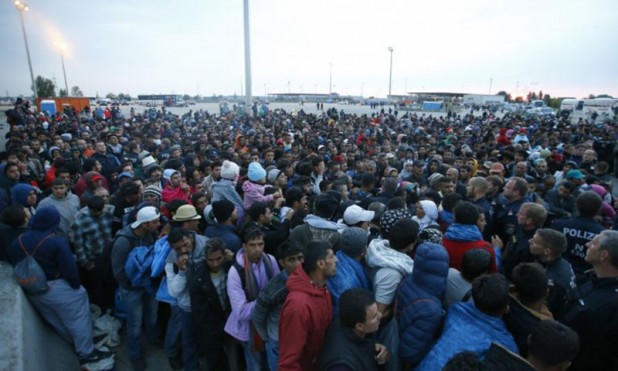The New Observer
October 24, 2015
The extent to which the nonwhite invasion has overtaken Germany is reflected in the fact that over half of that country’s lawmakers—previously all enthusiastic supporters of Angela Merkel—now oppose her “open doors” policy and are on the brink of a revolt, a new article in Der Spiegel magazine has admitted.
Der Spiegel—one of Germany’s most insidious leftist propaganda pieces—quoted a senior politician in Berlin as warning that Merkel now had less than three weeks to bring an end to the crisis, or the parliamentary caucus of her party would “be forced to act.”
To illustrate the extent of the crisis, the magazine used the village of Hesepe (population 2,500), one district of the small town of Bramsche in the state of Lower Saxony, as an example of the chaos engulfing the country.
Hesepe is now “hosting”, Der Spiegel said, “some 4,000 asylum-seekers” and has become a “refugees’ avenue.”
Der Spiegel goes on to describe the unfolding drama in Hesepe, which it says is a symbol of the crisis:
The main road “is like a pedestrian shopping zone,” says one resident, “except without the stores.” Red-brick houses with pretty gardens line both sides of the street, and Kathrin and Ralf Meyer are standing outside theirs. “It’s gotten a bit too much for us,” says the 31-year-old mother of three. “Too much noise, too many refugees, too much garbage.”
Now the Meyers are planning to move out in November. They’re sick of seeing asylum-seekers sit on their garden wall or rummage through their garbage cans for anything they can use. Though “you do feel sorry for them,” says Ralf, who’s handed out some clothes that his children have grown out of. “But there are just too many of them here now.”
The extent of the nonwhite invasion has overwhelmed the Germans—even though it was highly predictable to anyone who has even a basic understanding of race, racial differences, and the desire of the entire Third World to invade Europe and parasite off European-created wealth.
According to Der Spiegel, between September 5 and October 15—less than six weeks—some 409,000 nonwhite invaders were registered in Germany. This works out to an average of 10,487 every day.
This figure is an underestimate, however, as Der Spiegel went on to admit:
The argument is escalating because tens of thousands of asylum-seekers haven’t even been registered yet—no-one actually knows the exact number of refugees in the country. . . Tens of thousands of people are making their way to Germany along the so-called Balkan route…”
Furthermore, Der Spiegel admitted, Merkel’s announcement that she would send “asylum-seekers” from Kosovo and Albania home more quickly, has been undermined by a regulation that says refugees can avoid being deported by simply producing a medical certificate—which corrupt doctors are all too eager to produce.
Der Spiegel went on to reveal that the sudden influx of hundreds of thousands—and ultimately, possibly millions—of nonwhites has created “a shortage of basic supplies in many places in this prosperous nation. Cots, portable housing containers and chemical toilets are largely sold out. There is a shortage of German teachers, social workers and administrative judges.”
Der Spiegel went on to list the threats to Merkel from within her own party, the Christian Democratic Union (CDU).
The meetings of the party’s parliamentary group, which for many years radiated the boredom of an English gentleman’s club, now resemble tribunals against the chancellor. Meanwhile, Finance Minister Wolfgang Schäuble, the strong man in Merkel’s cabinet, also expressed his own dissatisfaction, in distant Peru, by cracking jokes about border controls in the former East Germany.
Merkel is looking increasingly isolated. Government sources say she has made refugee policy her personal concern, and now she is being left to deal with it on her own. Last week, Interior Minister Thomas de Maizière confided in his Luxembourg counterpart, telling him that Merkel did not have a plan, only “cold feet.”
Finally, Der Spiegel reveals, Merkel has been given three weeks longer to bring the crisis to a conclusion. According to that magazine, more and more lawmakers are joining the ranks of Merkel’s detractors. “By now, many more than half of the lawmakers would like to see a different policy,” one parliamentarian was quoted as saying.
Hans-Peter Uhl, a domestic policy expert with the Christian Socialist Union (CSU)—which is in coalition with Merkel’s CDU—predicted the end of Merkel’s political career if she doesn’t change her approach:
“When the people realize that the government cannot or will not protect them, then the people will elect a different government. The next party caucus is in three weeks. If the government hasn’t made something happen by then, then the caucus will have to act.”

